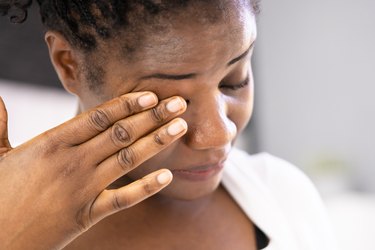
Baffled by the burning in your eyes? There are plenty of potential culprits for all that irritation — everything from your computer, to the climate, to bacteria and viruses.
Luckily, taking stock of your other symptoms (gunky discharge, redness, sensitivity to light), or lack thereof, can help you home in on the problem.
Video of the Day
Video of the Day
Here are seven common reasons for why your eyes feel like they're burning and how to put out the fire.
1. You Have Dry Eye
If your eyes feel like they're on fire, you may have dry eye — a condition in which your eyes don't make enough quality tears, says Laura Di Meglio, OD, an instructor of ophthalmology at the Wilmer Eye Institute at Johns Hopkins.
Other symptoms of dry eye include redness and a "gritty" sensation in the eyes.
One cause of dry eye is our increasingly digital lifestyles: If we aren't sitting in front of a computer, we're often staring at a tablet or phone, which causes eye strain. When we look at screens, we don't blink as often as we normally would — which is a problem, because every time we blink, we coat our eyes in a watery, oily mixture of tears that keep our eyes lubricated and healthy, according to the American Optometric Association (AOA).
That's why a long day spent in front of your computer can leave you with burning eyes and a headache.
Ironically, though, some people who have dry eye also have excessive tearing, so dry eye could be behind your watery, burning eyes. "When our eyes are dry, they tell our brain to make more tears," says Dr. Di Meglio. "But these tears are the wrong kind — they're reflex tears that don't help keep your eyes lubricated."
In other cases, dry eyes can be caused by age, because as we get older, we naturally produce fewer tears, according to the Mayo Clinic.
People are also susceptible to dry eye if they're in a dry, windy environment — or even an air-conditioned car, Dr. Di Meglio says — because dry air can cause our tears to evaporate quickly, drying out our eyes even further.
In rarer cases, burning eyes could be a symptom of Sjögren's syndrome, an immune system disorder marked by dry eyes and dry mouth, per the Mayo Clinic. It often occurs with other immune disorders, such as celiac disease or rheumatoid arthritis.
Fix it: If too much screen time is behind your symptoms, the cure for your burning, watery eyes may be to schedule regular reminders for yourself throughout the day to look away from the screen and blink. To combat dry air, put a humidifier in your room to add more moisture to the air.
You can also use artificial tears — a type of lubricating eye drop that contains many of the same elements naturally present in your tears — throughout the day to keep your eyes moist, Dr. Di Meglio says. We like Refresh Digital PF Lubricant Eye Drops ($13.96, Amazon). These are the best eye drops for burning eyes because they provide relief while being preservative-free (hence the "PF" in the name). Preservatives can irritate your eyes and make dry eye worse.
Artificial tears aren’t the same thing as redness-relieving eye drops, however, says Dr. Di Meglio. Redness-relieving drops are decongestants, which “cause the vessels in your eyes to constrict,” she says. “So when you stop using them, you get a rebound redness effect that can make your eyes feel drier.”
One exception, she says, is Lumify ($19.64, Amazon), a redness-relieving eye drop that works differently from traditional ones, and doesn’t cause rebound redness.
2. Your Allergies Are Acting Up
If your burning eyes are accompanied by itchiness, there's a good chance that eye allergies are to blame, says Dr. Di Meglio.
When you encounter an allergen — for example, something irritating in the environment like pollen or pet dander — your eyes produce a chemical called histamine, which helps fight off the offender.
The problem is, this histamine also causes the eyelids and clear tissue over the whites of the eyes (called the conjunctiva) to become itchy, irritated and swollen.
Other signs that allergies are to blame include a stuffy nose, sneezing, coughing or a sore throat, according to the American Academy of Ophthalmology (AAO).
Fix it: In many cases, the best way to ward off allergies is to avoid the allergens — for example, by staying indoors or wearing sunglasses when the pollen counts are highest (usually in the mid-morning and early evening); or, if you’re allergic to dust, using allergen-reducing bedcovers, according to the AAO.
Still, avoiding allergens can be easier said than done. If that’s the case for you, you may want to use artificial tears, which can help rinse the allergens from your eyes, or talk do your doctor about whether you’re a candidate for antihistamine eye drops.
3. You Caught Pink Eye
Pink eye — i.e., conjunctivitis — can be caused by a virus, a bacterium or allergies, says Dr. Di Meglio. The most common culprit is a virus, which can cause burning, redness and eye discharge (along with a runny nose and sore throat that can also spring up as a result).
Worth noting: Some September 2020 research in the Journal of Medical Virology found that about 1 to 3 percent of people with COVID-19 developed conjunctivitis, so it's possible your burning eyes are COVID-related.
A bacterial infection can also cause redness and soreness, but the eye discharge can range from a lot of pus to very little pus or none at all, according to the AAO.
On the other hand, pink eye that results from allergies tends to be triggered by irritants like pollen, pets or smoke — and like allergies, it can cause itchiness, redness and swelling.
Finally, if you've been in the pool a lot, you might develop a form of chemical conjunctivitis, or "swimmers eye" from the chlorine exposure. Burning eyes are a common symptom, as is a gritty sensation, discharge, swollen eyelids, eye redness, blurred vision and light sensitivity.
Fix it: If your pink eye is caused by a virus, you’ll likely just have to wait until your body fights off the infection, which usually takes about a week or two, according to the Centers for Disease Control and Prevention (CDC). The same goes for swimmers eye, and you should avoid chlorine exposure during that time.
If bacteria are to blame, then your doctor may prescribe you an antibiotic eye drop to help clear up the pink eye (antibiotics aren’t effective against viruses). Bacterial conjunctivitis can go away sooner, in two to five days, though it can also take up to two weeks.
And if the conjunctivitis is caused by allergies? You can combat the symptoms by taking allergy eye drops, though there are many natural remedies for allergies, too, like staying indoors on days when the pollen count is too high.
4. You Have Ocular Rosacea
You may already be familiar with rosacea — a skin condition that causes redness and small bumps on the face. What's less commonly known, though, is that rosacea can develop near the eyes.
With ocular rosacea, "The oil glands all along your eyelids will get inflamed, just like your skin," says Dr. Di Meglio. This inflammation interferes with the glands' normal production of oil, which helps keep your eyes lubricated. The end result: red, burning, itchy eyes.
Fix it: Some doctors recommend washing your eyelids to keep them clear of microscopic mites or other infection-causing organisms, which may cause the eyelids to swell and become red, according to the AAO. Start by applying baby shampoo and warm water to a washcloth and gently cleaning the eyelids.
Your doctor may also prescribe oral antibiotics like doxycycline for rosacea or a topical antibiotic that can be applied to the eyelids, says Anupama Horne, MD, an ophthalmologist with Duke Health.
5. You Have Blepharitis
Bacteria is everywhere — including at the base of the eyelashes, where, for some people, the bugs can cause an inflammatory condition called blepharitis. The symptoms of blepharitis include burning, sore eyes and flaky or oily crusts that collect on the lashes.
Sometimes blepharitis can be caused by microscopic mites called Demodex, which live inside our eyelash follicles, says Dr. Di Meglio. In other cases, it can happen when the oil glands in the eyes become clogged, according to the Mayo Clinic.
Fix it: Blepharitis is usually a chronic problem, says Dr. Horne, so you may need to clean your eyes every day to ward off the irritation. To do so, apply some baby shampoo or an over-the-counter eyelid cleanser like OCuSOFT ($21.95, Amazon) to a clean cloth and wipe off the debris on the base of the eyelashes.
You can also apply hot compresses to your closed eyes, she says. This will help loosen the oil in the eyes, preventing a clog, while also helping to loosen the build-up of crust that may have settled on the eyelashes. Try keeping the compresses on for a few minutes a day.
6. Your Contacts Are to Blame
There's a laundry list of reasons why, when you pop in your contacts — or you take them out — your eyes start to burn. For example, you may have worn them for too long (or overnight), not cleaned them properly or waited too long to change them.
The thing is, all these habits can increase the risk of developing keratitis, the most common eye infection that results from wearing contacts, according to the AAO.
Fix it: If you’re experiencing the symptoms of keratitis — including burning, pain, discharge, blurry vision or light sensitivity — call your eye doctor, who can diagnose the problem.
If the infection is mild, you may only need eye drops like artificial tears or antibiotics, for example. If the infection is more severe, you may need anti-inflammatory eye meds or oral medications, according to the AOA.
7. You Got a Sunburn — on Your Eye
Your skin isn't the only part of your body that's susceptible to a sunburn — your eyes can also be harmed by too much sunlight. That's because the ultraviolet radiation from the sun (or a tanning bed) can damage the thin, outer layer of the eye's cornea as well as the tissue covering the whites of the eyes.
The technical name for an eye sunburn is photokeratitis — and according to the AAO, the symptoms, like pain, burning and vision blurriness, don't appear until the damage is already done.
Your doctor can diagnose photokeratitis by examining your eyes and putting a fluorescein dye in them to look for any signs of a burn.
Fix it: Luckily, photokeratitis usually goes away after a day or two, but you can ease the symptoms by placing a cold washcloth over your closed eyes and taking a pain-relieving medication like ibuprofen.
If you wear contacts, be sure to take them out of your eyes right away (the last thing you need is a lens rubbing against your already-irritated eyes).
To prevent photokeratitis in the future, wear sunglasses that block at least 99 percent of UV rays when you’re outdoors. Remember: You’re not just at risk for a sunburn at the beach — you can also get photokeratitis in the winter, because the sunlight can reflect off of the ice and snow, damaging your eyes. If you’re skiing or snowboarding, wear UV ray-blocking snow goggles.
When to See a Doctor About Burning Eyes
The good news: "A lot of the treatments for these things are available over the counter and manageable for patients at home," says Dr. Horne.
Still, there are some symptoms that may signal a more serious problem. For example, "persistent, or progressively blurry vision, or symptoms that aren't being managed well with over-the-counter remedies" warrant a call to your doctor, she says.
Or, if you're having significant pain, eyelid swelling, pus-like discharge or puffiness in one eye — even if you know what's causing it — you may need to see a doctor for a prescription like a steroid or antibiotic.
If you wear contacts, you may want to be a little quicker to call your doctor when your eyes are burning — especially if you left your contacts in too long or were exposed to dirty water (a particularly nasty parasite called Acanthamoeba can live in water and cause a serious infection). In this case, stop wearing your contacts until you see your eye doctor.
- Mayo Clinic, “Dry Eyes”
- American Academy of Ophthalmology, “What Are Eye Allergies?”
- American Academy of Ophthalmology, “Pink Eye (Conjuctivitis)”
- American Academy of Ophthalmology, “Ocular Rosacea”
- American Academy of Ophthalmology, “What Is Blepharitis?”
- American Academy of Ophthalmology, “What Is Photokeratitis — Including Snow Blindness?”
- American Optometric Association, “Keratitis”
- American Optometric Association, “Dry Eye”
- Centers for Disease Control and Prevention, “Conjunctivitis (Pink Eye)”
- Mayo Clinic: "Sjogren's syndrome"
Is this an emergency? If you are experiencing serious medical symptoms, please see the National Library of Medicine’s list of signs you need emergency medical attention or call 911.


